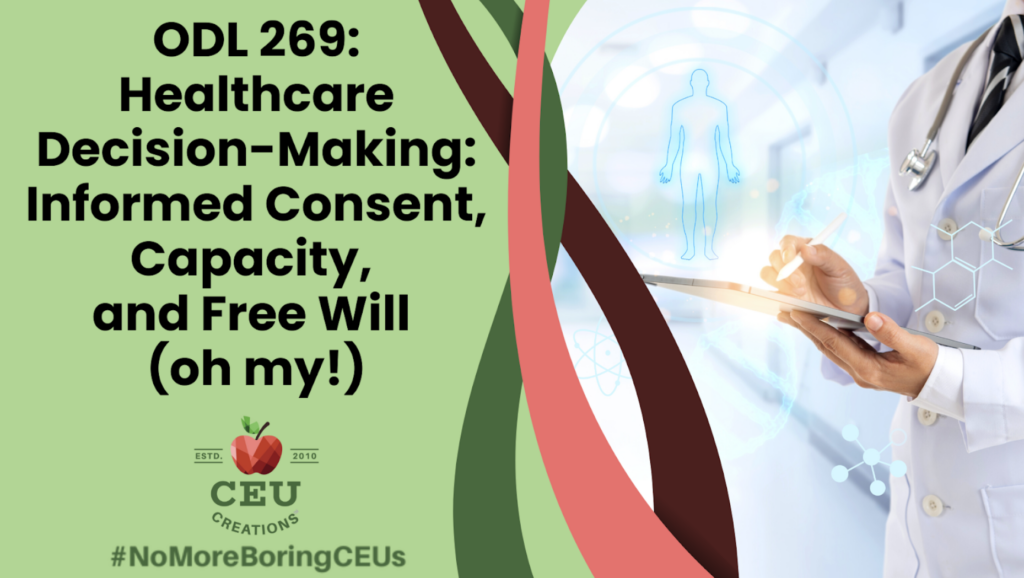On-Demand CE Training
ODL 269: Healthcare Decision-Making: Informed Consent, Capacity, and Free Will (oh my!)

Created on 08/24/2023
Target Audience:
This course is targeted for social workers, case managers, nurses, and counselors.
Overview:
Informed consent is a critical aspect of patient autonomy and respecting the dignity and worth of our patients. The consent process empowers patients to make informed decisions about their own care, treatment, and participation in medical research. There is an art and craft to high quality informed consent, often lost in the increasingly virtual, fast-paced healthcare environment. Within the informed consent process, there is an assumption that the patient has the ability to process the information they are receiving, weigh the benefits and consequences, and make a knowledgeable decision. When there is concern about the patient’s insight and judgment during this process, the next step is a capacity assessment. This presentation will begin with a discussion of best practices and principles of informed consent and then move into a discussion of how to assess decision-making capacity. The speaker will also explore legal and ethical principles at play when discussing decision-making capacity, and how a clinician can move forward when a patient makes an “unwise” decision.
Course Objectives:
By the end of the session – the participant will be able to:
- Define the principles of informed consent
- Describe the triggers for a capacity assessment
- Discuss the ethical principles at play when assessing decision-making capacity
- Identify complex situations that require additional system support
Presenter:
Lisa Bednarz, LCSW, CMAC, ACM-SW, ASW-G, Regional Director of Case Management for Robert Wood Johnson Barnabas Health
Lisa began her career serving as a community guardian for incapacitated older adults before joining NewYork-Presbyterian’s distinguished geriatrics team, and ultimately moving fully into healthcare leadership. She has front-line experience navigating the intersection of the healthcare and legal systems and uses this knowledge to educate physicians on ethical issues in gerontology, including capacity assessments and elder abuse. She has developed and implemented screening tools and response protocols to address elder abuse within the acute care setting. Lisa has advanced training in trauma-focused care, family systems, and healthcare management. She is a former Hartford Fellow in Geriatric Mental Health and a former advisor for the Vulnerable Elder Protection Team at Weill Cornell Medical College. Lisa operates a small geriatric care management practice and acts as a consultant and speaker on psychosocial health in the aging population and ethical decision-making in work with cognitively impaired clients.
2 CREDIT HOURS APPROVED FOR:
Social Workers
ASWB ACE – 2 Ethics CE Credits
New York State Education Department’s State Board for Social Work – 2 Contact Hours
Case Managers
CCMC – 2 Ethics Hours
Nurses
California Board of Registered Nursing – 2 Contact Hours
Counselors
2 Ethics Hours or 2 Contact Hours*
NBCC ACEP – 2 Contact Hours
New York State Education Department’s State Board for Mental Health Practitioners – 2 Contact Hours
* Some states do not require/accept ethics hours for counselors, for those cases contact hours will be awarded.
Please make sure to check with your own state board to ensure the transferability of CE credit for an asynchronous course. Some state boards may place restrictions regarding the modality of training required for ethics credits to be awarded. If this training indicates ethics credits are available, please verify that your state allows them to be earned through an on-demand course format.
